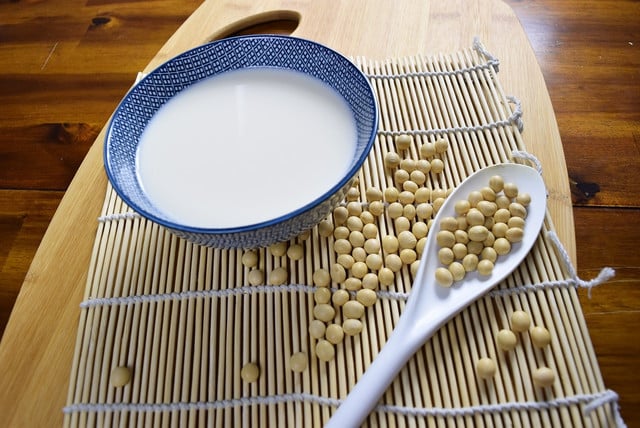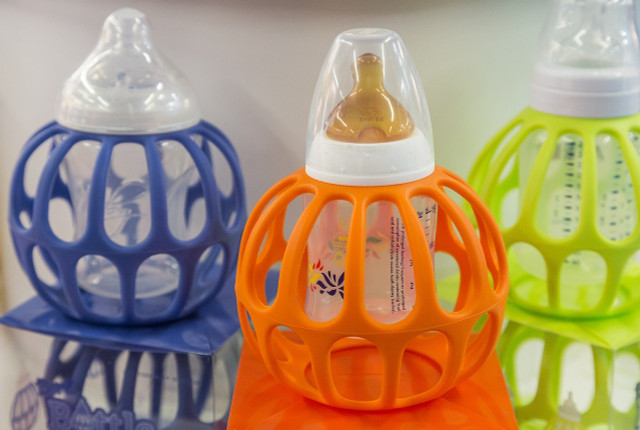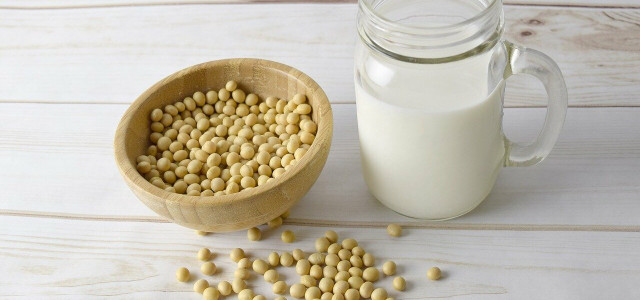Is soy milk safe for toddlers to drink? At what age can babies transition to drinking soy milk? Read on to learn all about this plant-based milk.
Soy milk has been popular as an alternative to cow’s milk since the 1960s, and even with all of the other vegan options out there, is still a popular and smart transition from breast milk for toddlers. Soy milk is made up of soybeans, water, and added vitamins and minerals. The beans are cooked, then pressed until the fiber becomes separate from the liquid. Most brands add fortified nutrients into the milk to give it more calcium, vitamin D and omega 3. If you have a child who is allergic to dairy, lactose intolerant or you have other reasons for not wanting your child to drink dairy, soy milk can be a good choice. Read on to learn why.
Is Soy Milk Safe for a Toddler?



(Foto: CC0 / Pixabay / bigfatcat)
Many parents may not want to give their toddler cow’s milk due to dietary restrictions, or because their child may develop a sensitivity, intolerance, or allergy. There is a lot of conflicting information out there about soy milk as a vegan alternative to cow’s milk. Soy milk is a full protein on its own, making it a very near substitute for cow’s milk in terms of nutrition and the needed elements for babies to grow properly.
Experts assume that soy milk can be safely consumed by toddlers over the age of one year and that there are no harmful effects on nutrition or development. Before age one, babies stomachs cannot handle regular cow’s milk due to its protein count, and plant-based options, including soy milk, do not provide enough nutrients for babies early on, so doctors recommend only breast milk or formula. Between the ages of one and five, babies should drink mainly whole milk or fortified unsweetened soy milk, which is nutritionally equivalent, and water. Toddlers should drink no more than two or two and a half cups per day. This is the same across all milk types, including soy.
In order to get the best nutrients for your toddler, look for the whole fat soy milk that is vitamin fortified. It is recommended that you speak with a doctor or nutritionist to determine the correct brand of soy milk, as these often vary.
Benefits and Drawbacks of Soy Milk For Toddlers
The benefits of soy milk are that your child can get similar nutrients of cow’s milk like calcium and vitamin D by drinking soy while still maintaining a vegan lifestyle, if that’s what you desire. It is a great option for children who are lactose intolerant or allergic to cow’s milk. Soy milk has isoflavones, which may supports heart health, provide you with antoxidants and all nine essential amino acids.
A potential drawback to soy milk is that some children develop an allergy to soy. According to the FDA, soy milk is one of the eight major allergens worldwide. This soy allergy can manifest as a rash or vomiting. Some children that are allergic to cow’s milk also show an allergy to soy, so be sure to talk to your doctor if you notice any symptoms.
Soy consumption in children can also increase their risk of Kawasaki disease, an autoimmune condition that causes inflammation in arteries which can result in irreversible damage to the heart.
Another potential drawback to soy milk is that some soy milks are not produced sustainably and can have an adverse effect on the Amazon rainforest. To ensure you are buying sustainable soy milk, read the labels to see that the soybeans were grown in the US, China, or Canada, where deforestation isn’t needed to grow the soy crops.
Introducing Soy Milk to Toddlers



(Foto: CC0 / Pixabay / PX41-Media)
Soy milk can be gradually introduced into your toddler’s diet. If they are over a year old, soy milk can safely be given. Start by adding a small amount with your breast milk or milk formula so that they can get used to the taste. Gradually increase the amount, but do not exceed three servings a day.
Read on:
- How to Freeze Milk for Kids – and How to Defrost it Safely
- How to Boost Your Kids’ Immune System: 5 Healthy Tips
- Tofu Health Benefits: Behind the Protein Powerhouse
Do you like this post?







